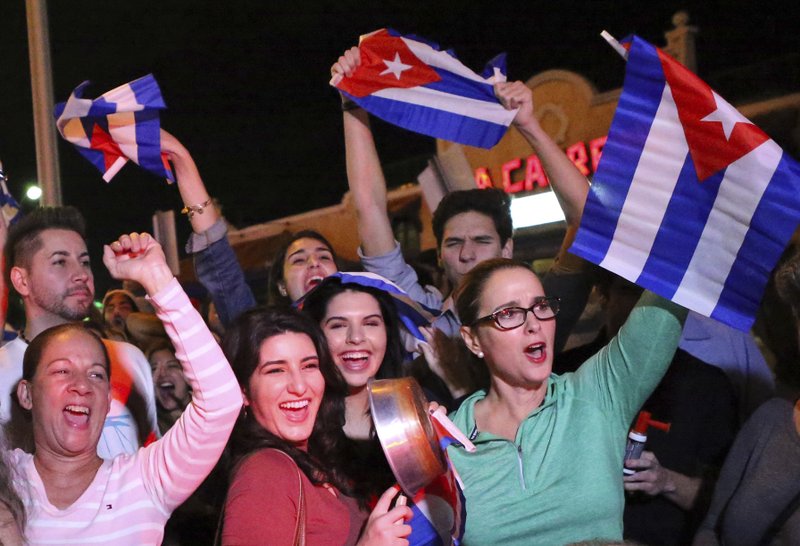MIAMI -- Isabella Prio was born in Miami and is 20 now and a junior at Boston College. She fully expects to return to Cuba someday and help shape the island's future. But she's never been to the country -- where her grandfather was once president -- and she refuses to visit until it's a democracy.
Cherie Cancio, 29, also was born in Miami and runs tours to the island for young Cuban-Americans eager to explore their heritage.
Two daughters of exile. Both are passionate in wanting to effect change in a country that has been in the grasp of the Castro brothers' authoritarian rule for decades, but very different in their approaches.
For the hundreds of thousands of children like Prio and Cancio born of Cuban exiles -- some of them two and three generations removed from the island -- Fidel Castro's death potentially opens a door to a world long off-limits.
But Prio, a finance and marketing student, is disappointed when she sees friends' photos of Cuba on Instagram and Facebook. Her views are more in line with people her parents' and grandparents' age.
Prio's grandfather, Carlos Prio Socarras, was president of Cuba from 1948 until 1952, when Fulgencio Batista organized a coup and overthrew the government. Socarras fled the country and backed Castro financially. He later called it the worst decision of his life.
Millennial Cuban-Americans say Castro's death at the age of 90 symbolically offers hope for improved dialogue between the countries.
"It's definitely in the hands of the young people to take it over," Prio said. "We just have to be careful about how we go about it."
How that dialogue will unfold is anyone's guess, and while attitudes are shifting, the community is still divided on the best way to chart a new course for the island -- or whether Miami's exiles even should play a role.
"Young Cuban-Americans really want engagement on the island," said Guillermo Grenier, a professor of sociology at Florida International University in Miami and a lead investigator of the university's Cuba Poll, an annual poll of Cuban-Americans co-sponsored by the Cuban Research Institute.
Still, said Grenier, "how younger Cuban-Americans feel about Fidel Castro dying is kind of independent" of their interest in engaging with the island.
The most recent Cuba Poll was taken in August. It showed that Cuban-Americans ages 18 to 39 are disenchanted with the embargo, desire expanded business opportunities and favor the establishment of diplomatic relations between the two countries. They frequently side with President Barack Obama, who visited Cuba in March.
"There's been a shift of millennial Cuban-Americans, who are more open to President Obama's policies," says Cancio, whose father reached Florida on the Mariel Boatlift in the 1980s.
She admits that the children of exiles grapple with wanting to learn about their heritage while being respectful of their parents' struggles. Many millennials want to go to Cuba but are hesitant to do so out of respect for their parents' position that the Castro regime must relinquish power, and that democracy must be installed, before any substantial engagement.
"We all respect the sacrifices and the history of our parents, especially those of us from Miami," she said.
That's why she believes in educating Cuban-Americans while building bridges with folks in Cuba.
"We want Cuban-Americans to visit Cuba, experience it, talk about it, and think about what an emerging Cuba means for them and their communities in the U.S.," reads the website of CubaOne, Cancio's nonprofit.
Still, Cancio doesn't believe she or the Miami-born children of exiles have any role to play in reshaping Cuba. That's up to the people on the island, she says.
"I have the freedom here to support whatever policies I want," Cancio said. "I don't know I should have that freedom in another country, even if my father was born there."
Michelle Alfonso, a 25-year-old illustrator, also said she doesn't "necessarily feel entitled to choose [Cubans'] future." Alfonso traveled to Cuba this year, becoming the first in her family to go back to their ancestral homeland in more than a half-century.
The New York resident says more Cuban-Americans should make the trip.
"I had grown up with this mysterious Cuban culture, and now my whole life made sense," Alfonso said, adding that the trip made her feel "whole again."
Javier Gonzalez, a 21-year-old University of Miami junior, feels that Cuba is his birthright. His father came from Cuba and hasn't returned. Gonzalez also hasn't visited.
"A free Cuba or nothing," said Gonzalez, who is majoring in political science, economics and aquaculture.
Gonzalez thinks of Cuba as his home and of returning someday to what he calls "paradise lost."
Castro's death "isn't equivalent to liberty, but it's a step toward liberty," Gonzalez said.
A Section on 11/29/2016

